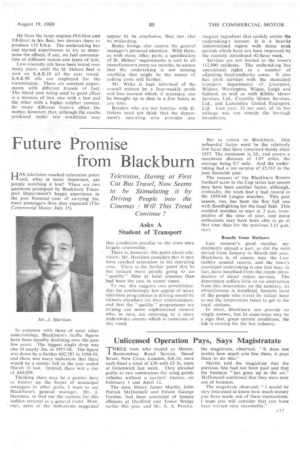Future Promise from Blackburn
Page 53

If you've noticed an error in this article please click here to report it so we can fix it.
Television, Having at First Cut Bus Travel, Now Seems to be Stimulating it by Driving People into the Cinemas. Will This Trend Continue ?
Asks A Student of Transport
HAS television reached saturation point and, what is more important, are people watching it less? These are two questions prompted by Blackburn Transport Department's happy experience in the past financial year of carrying Im. more passengers than they expected (The Commercial Motor, July 15).
In common with those of most other undertakings, Blackburn's traffic figures have been steadily declining over the past few years. The biggest single drop was one of nearly 3m. in 1957-58. The figure was down by a further 602,787 in 1958-59, and there was every indication that there would be a similar fall in the year ended March 31 last. Instead, there was a rise of 444,059.
Thinking there may be a pointer here to bolster up the hopes of municipal managers in other parts, I went to see Blackburn's general manager, Mr. J. Harrison, to find out the reasons for this sudden reversal in a general trend. However, most of the indications suggested that conditions peculiar to the town were largely responsible.
There is, however, this point about television: Mr. Harrison considers that it may have reached saturation in his operating area. There is the further point that he has noticed more people going to see " quality " films at local cinemas than had been the case in recent times.
To me, this suggests two possibilities: that the continuingly low appeal of many television programmes is driving would-be viewers elsewhere for their entertainment. and that the." quality" programmes are turning out more sophisticated viewers who, in turn, are returning to a more wide-awake cinema which is conscious of this trend.
But to return to Blackburn. One influential factor must be the relatively low fares that have remained steady since 1957. The minimum is 2d., and covers a maximum distance of 1.07 miles, the average being 0.7 mile. And the undertaking had a net surplus of £5,313 in the past financial year.
The success of the Blackburn Rovers football team in the Cup series last season may have been another factor, although, ironically, the team had a bad record in the 1959-60 League matches, This past season, too, has been the first full one with floodlighting for the local field. This enabled matches to start at 3 p.m. irrespective of the time of year, and more enthusiasts may have been able to go at that time than for the previous 2.15 p.m. start.
Benefit from Railcars Last summer's good weather undoubtedly played a part, as did the mild period from January to March this year. Blackburn is, of course, near the Lancashire coastal resorts, and the town's municipal undertaking is one that may, in fact, have benefited from the recent introduction of diesel railcar services. The department suffers little or no abstraction from this innovation; on the contrary, its attractiveness is beneficial, because most of the people who travel by railcar have to use the corporation buses to get to the local stations, In short, Blackburn can provide no simple answer, but its experience may be a sign that, given certain conditions, the tide is turning for the bus industry.
































































































